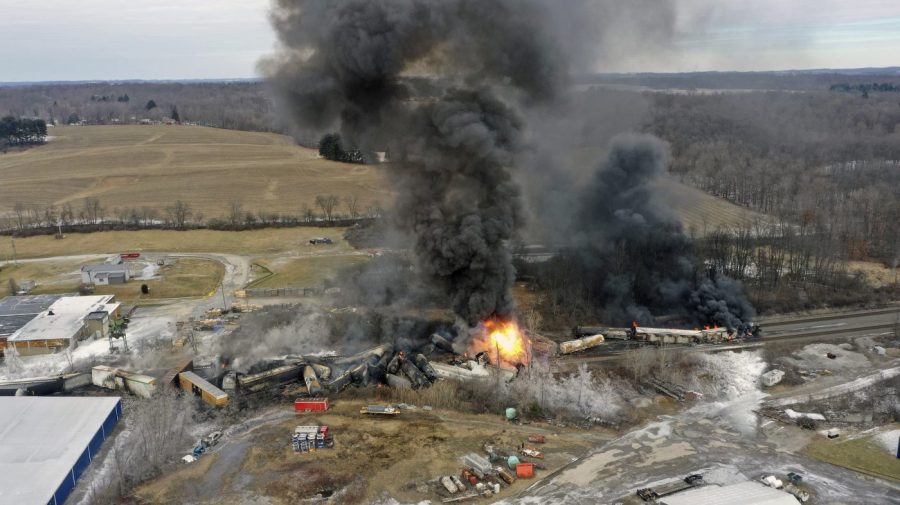A bipartisan push to bolster railroad safety is turning into a slog as top Senate Republicans indicate they are not yet on board with the main legislative response to the East Palestine, Ohio, train derailment.
Ohio Sens. J.D. Vance (R) and Sherrod Brown (D) unveiled a rail safety proposal last week that has already won over the White House and top Democrats. But winning support from Republicans is proving to be harder as some question if it is too soon to move on a bill that could have unintended consequences.
“We’ll take a look at what’s being proposed, but an immediate quick response heavy on regulation needs to be thoughtful and targeted,” Sen. John Thune (S.D.), the No. 2 Senate Republican, told The Hill.
“Let’s define the problem. Let’s figure out what the solutions are and if there are things we need to fix, we’ll fix them,” Thune continued.
Vance and Brown’s Railway Safety Act would boost safety requirements for trains carrying hazardous materials, call for more frequent inspections of rail cars, increase fines for safety violations and greenlight $27 million to examine possible other safety improvements.
The bill would also require more frequent use of sensors that detect overheated wheel bearings. The East Palestine train’s sensors failed to detect the problem in time, causing the derailment, according to a preliminary National Transportation Safety Board (NTSB) report.
However, the proposal leaves the specifics of the new rules to the Department of Transportation, causing some concern among Republicans.
Thune added that he was “uncomfortable” giving “much more power” to the department and Transportation Secretary Pete Buttigieg, who has been the subject of intense criticism from Republicans.
Vance told The Hill in a brief interview that while he has been encouraged by the initial reaction to the bill, he acknowledges there are a number of mountains to climb before it can get across the finish line. Among those: the absence of the final report by the NTSB and opposition from the powerful railway lobby.
“But I actually think there’s something to be done here,” he said.
Railroad industry could derail new rules
The railroad industry is gearing up to oppose stricter federal rules, arguing that the industry should be able to regulate itself. Railroads have long opposed government regulations, arguing that they’re too costly and burdensome, and frequently recruit Republican lawmakers to weaken or delay them.
Norfolk Southern, the company whose train derailed in East Palestine, was among several major rail operators to help defeat federal and state measures meant to boost rail safety.
The American Association of Railroads, which lobbies on behalf of Norfolk Southern and the other top U.S. railroads, told The Hill that the Railway Safety Act would not have prevented a similar crash. The group said that it plans to work with “all stakeholders to meaningfully advance real solutions.”
Norfolk Southern on Monday rolled out its own safety plan to install around 200 additional hot wheel bearing detectors to its trains and develop more effective technology and industry standards for the early warning systems.
Norfolk Southern CEO Alan Shaw, who will testify before a Senate panel Thursday, said in a statement that the NTSB report shows the need for a “comprehensive industry effort” to improve safety.
“We are eager to help drive that effort and we are not waiting to take action,” he said.
Another Norfolk Southern train derailed in Springfield, Ohio, on Saturday. While the cars weren’t carrying hazardous items, the incident prompted renewed calls for action by Democratic lawmakers.
Rail workers want stricter regulations
The Railway Safety Act already has the support of the largest rail worker union in the U.S.
SMART-TD President Jimmy Ferguson last week urged Congress to swiftly pass the bill “without being watered down by negotiations or the special interests that will seek to stop it and claim that it is too ‘burdensome’ for a highly profitable industry to implement.”
The measure would mandate two-person crews — a rule the Biden administration is already pursuing that has drawn thousands of supportive comments from workers who said they wouldn’t be safe working solo.
Fritz Edler, a retired 40-year railroad worker and advocate at Railroad Workers United, said that the bill includes many measures workers have prioritized. But he’s also concerned that the rail industry could push the Transportation Department to issue weaker regulations.
Edler noted that the Trump administration and GOP lawmakers worked to scrap several Obama-era railroad regulations, including a rule that would have required more trains to install advanced braking systems, at the behest of the railroad industry.
“Most of that comes down to the immense, unimaginable power that the railroads have,” Edler said.
Bipartisan rail safety bill runs into Republican roadblock




